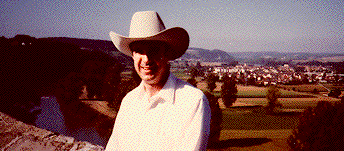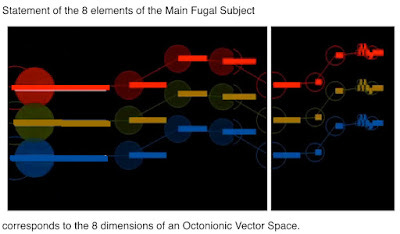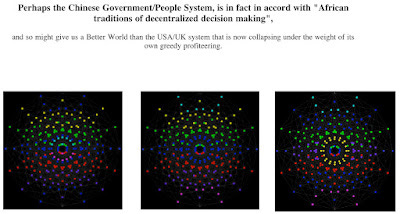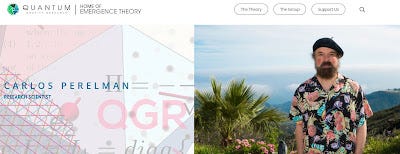Talking about Science: 3 Tony Smith and “arXiv.org”, Carlos Castro Perelman and the tide
Being truly independent within science is nowadays extremely difficult, if not impossible as I hinted in my introduction. I have scientist colleagues who try to be independent, and I know the problems they face. Tony Smith was one example.
Tony Smith
He received a summa cum laude A.B. degree in mathematics from Princeton University in 1963. He enrolled in graduate studies at Georgia Tech, and worked there under the guidance of a somewhat eccentric and original theoretical physicist, David Finkelstein, but failed his exams:
He was working full time as a lawyer and pursuing his original research in theoretical physics and mathematics at the same time. Probably that would go unnoticed, but Tony dared to create an original and popular website, where he was presenting his ideas. That was too much! He was blacklisted from the physics archive - “arxiv.org” - and he was regularly attacked by the “guardians of science” whenever an opportunity arose. To quote from one discussion blog in the past:
The anonymous comment left yesterday on the guest post by Tony Smith annoyed me quite a bit.
The visitor, instead of discussing the topic presented in the post, decided to produce a personal attack on Tony, guilty of having a web site of his own, containing personal theories and ideas. At the heart of the comment was a question directed to me: why do you give credit to this person, who is evidently a crackpot?”
On January 23, 20202 Peter Woit commented as follows:
"I was sorry to hear of the death a few months ago of Tony Smith, who had been a frequent commenter on this blog and others. Unfortunately my interactions with him mainly involved trying to discourage him from hijacking the discussion in some other (often unusual) direction. Geoffrey Dixon did get to know him well, and has written a wonderful long blog entry about Tony, which I highly recommend (Dixon’s newish blog also has other things you might find interesting)."
You can find the full list of Tony's publications on vixra.org here.
As an example of his extraordinary wide interests and knowledge, let me point out here to just two of his papers:
1. Overture to Beethoven’s Grosse Fugue (Opus 133) is an Outline of the E8 Lie Algebra
3. And the video
Carlos Castro Perelman and the tide
Carlos Castro Perelman, a theoretical physicist, suffered in the past a similar fate as Frank Dodd (Tony) Smith, Jr.
Carlos received his PhD in physics in 1991 from the University of Texas, Austin. His research goals, as stated in his CV, include:
Research in the Extended Relativity Theory in Clifford spaces; Gravity, Strings and Membranes; Grand-Unification; Fractals, Quantum Field Theory, Mathematical Physics, Noncommutative Geometry and Number Theory.
In the past Carlos was formally affiliated with the Center for Theoretical Studies of Physical Systems, Clark Atlanta University, but he had no permanent job. He was also blacklisted from arxiv.org, but this issue I will discuss later on.
At present, he is on the staff of "Quantum Gravity Research" founded by Klee Irwin.
Carlos is a coauthor of "Against the Tide"
Against the Tide :A Critical Review by Scientists of How Physics and Astronomy Get Done
Authors: Carlos Castro, Martín López-Corredoira, Juan Miguel Campanario, Brian Martin, Wolfgang Kundt, J. Marvin Herndon, Marian Apostol, Halton C. Arp, Tom Van Flandern, Andrei P. Kirilyuk, Dmitri Rabounski, Henry H. Bauer
Abstract: Nobody should have a monopoly of the truth in this universe. The censorship and suppression of challenging ideas against the tide of mainstream research, the blacklisting of scientists, for instance, is neither the best way to do and filter science, nor to promote progress in the human knowledge. The removal of good and novel ideas from the scientific stage is very detrimental to the pursuit of the truth. There are instances in which a mere unqualified belief can occasionally be converted into a generally accepted scientific theory through the screening action of refereed literature and meetings planned by the scientific organizing committees and through the distribution of funds controlled by "club opinions". It leads to unitary paradigms and unitary thinking not necessarily associated to the unique truth. This is the topic of this book: to critically analyze the problems of the official (and sometimes illicit) mechanisms under which current science (physics and astronomy in particular) is being administered and filtered today, along with the onerous consequences these mechanisms have on all of us. Apart from the editors, Juan Miguel Campanario, Brian Martin, Wolfgang Kundt, J. Marvin Herndon, Marian Apostol, Halton C. Arp, Tom Van Flandern, Andrei P. Kirilyuk, Dmitri Rabounski and Henry H. Bauer, all of them professional researchers, reveal a pessimistic view of the miseries of the actual system, while a glimmer of hope remains in the "leitmotiv" claim towards the freedom in doing research and attaining an acceptable level of ethics in science.
To understand how bad it is nowadays you should read L.P. Koch, The death of Science", and also Adam Mastroianni, "The rise and fall of peer review Why the greatest scientific experiment in history failed, and why that's a great thing".
Carlos' publications listed on vixra.org make a huge impression. His interests include such topics as:
Noncommutative Clifford Phase Spaces,
Born Reciprocal Relativity,
The Riemann Hypothesis,
Black Hole Thermodynamics,
Gravitational Entropy,
Jordan Algebra Models,
Quantum Gravity,
Fractal Cantorian Spacetime,
Conformal Gravity,
Hopf Algebras,
Two-Times Physics,
Octonionic Nonassociative,
Ternary Gauge Field Theories,
Nonlinear Quantum Mechanics,
Noncommutative Phase Spaces,
Complex Domains,
Holography,
Carlos Castro Perelman also has interesting ideas about fractal universes. Apparently fractal universes are not what mainstream science is willing to tolerate. Laurent Nottale, who developed a number of interesting new ideas concerning fractal physics, does have a job – at LUTH Laboratory, Paris-Meudon – but he does not have an easy life. From what I know he is considered a black sheep in the community of “serious scientists” (read mainstream authoritarian followers).
Iconoclasts in Science and Peer Review
What is common to both of these iconoclasts is that their papers somehow failed to follow the strict rules of important journals. Yet the same journals do publish papers that do not follow the rules – if these papers have an “important supporter”.
I know this type of situation very well. What sometimes happens is that your paper gets rejected, but your original idea is then stolen and developed by someone else with more influence or someone who has influential friends. David Ruelle, a mathematical physicist who has made important contribution in statistical mechanics, who is also an honorary professor at IHES, Bures-sur-Yvette, wrote about his own experiences with the peer-review process in his book “Chance and Chaos”:
Reasonable looking papers are accepted, obviously bad papers are rejected, and good papers that are a bit original and out of the norm tend to be rejected too.
And then he added:
I myself worked in some areas in which I could freely discuss ideas with colleagues, and other areas in which it was unwise, because of the risk that the ideas would be stolen.
Coming next: Bertrand Russell and Independence in Science
If you are interested in a mostly mathematical discussion, my math blog is HERE.





